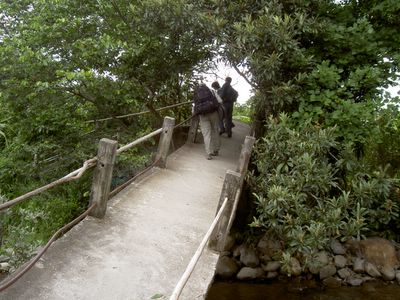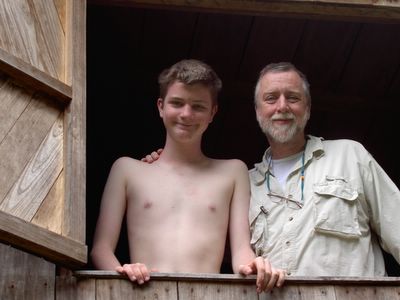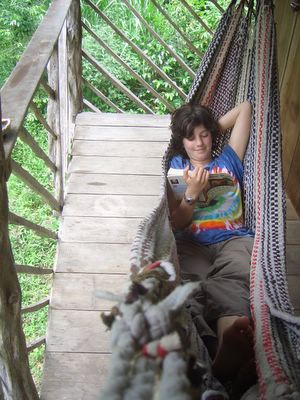Diane: We finally made it to Vilcabamba, but without a reservation. I had wanted to stay at the Rumi-Wilco lodge, which is a bit out of town in a private nature reserve next to a National Park. The owners are naturalist-biologist-guides. Natural reserve plus naturalist owners sounded like a great mix. They have a cabin called the Pole House. It sits atop stilts by the river with a kitchen and deck - all in all perfect for us. Unfortunately, based on prior email correspondence, it was unavailable until February. I was hoping for a last-minute cancellation.
Vilcabamba was known as the valley of longevity for many years. A recent twist on this theme has resulted in a number of budget accommodations with spa services. I firmly believe that for every hour of massage you get when you need it, you add at least 2 hours to your life. Based on this rule-of-thumb and Tom's generosity with massages, Tom has ensured me a long life :-). And I know, based on almost all adolescents' obsession with any and every whitehead, blackhead, red-blotch and anything else that could be construed as a pimple, TM and Calliope would each exuberantly welcome a facial. So, a hostel-spa was another enticing option.
We arrived at the Vilcabamba bus station very hungry. We had changed buses in Loja, which had a couple of restaurants inside the terminal. I had lobbied to stop and eat, since it was already 1pm. But to no avail. Tom did not want to stop for anything, since we might miss the last bus to Vilcabamba. This worry was entirely misplaced, since there were scheduled buses running every 15 minutes from early morning to late at night. Logic did not sway Tom's firm stance. TM thought we should get going so that we could find a place to stay and get settled sooner rather than later. He feels the same way about homework - better to get it all done at school rather than worry about all those nasty details, such as bringing home the right textbooks or writing down the assignment. Calliope was hungry, but didn't see any obvious vegetarian options at the bus terminal and had no interest in inquiring. Since I try to take everybody's desires into consideration, the majority ruled and we took the next bus to Vilcabamba. Sometimes I think I should be more dictatorial.
When I inquired about the bus schedule and fare to Vilcabamba, I was told the fare was $1.30 each. After the disheartening discussion about whether to eat in the terminal, I returned to purchase tickets. For the four of us, the total was $6.00, which means that the individual fare had gone up $.20 each in the last 15 minutes. Although the difference was small, I hate the feeling of being fleeced. I reminded the ticket-seller that she had already told me the price and after a bit of haggling she agreed to the original fare.
Now this is a situation, when my command of Spanish is sufficient to deal with the practical details, but insufficient to give me the insight I prefer. I have been told that the bus rates in Ecuador are set by the government. You never have to bargain concerning bus fares, nor do you have to worry about being overcharged if you forget to ask the fare ahead of time. Having grown up in the U.S., I find this reassuring. But, there still seems to be quite a bit of variability. For example, passage from one city to another may cost significantly more depending on the exact route. Some companies with nicer buses charge a dollar or two more, but this is not always the case. Although I didn't realize it, the company I was dealing with today ran both cramped vans and large luxury buses. The ticket-seller did not tell us that she was selling us tickets on one of the cramped vans, but that might have explained the price difference. People here have been so nice to us that I now hesitate to assume that we will be taken advantage of just because we are tourists.
We had a bit more trouble purchasing tickets, because the ticket-seller didn't have change for a ten. Lack of change is a continuing problem in Ecuador. I think it is primarily caused by dollarization. Since the local currency is now the U.S. dollar, the Ecuadorians can't manufacture their own currency. They have to get it from the U.S. Early on, coins were next to impossible to come by, so they reverted back to the old centavo pieces. But singles also pose a problem. They are probably the most commonly used denomination and as such they get wrinkled, written on, torn, and then unacceptable in short order. As a result, there are far more Sacagawea coins than one dollar bills. Even so, there is a dearth of coins and small bills. Restaurant proprietors and venders of all types are always running next door for change. ATM machines almost universally spit out $20 bills, so as a traveler, my brain devotes a small, but constant undercurrent of thought to which bill to use when. Today, I offered to check some of the other bus companies to see if they had change. Nobody had change. Finally, the ticket-seller looked in some drawers, her purse, and some envelopes and come up with the necessary bills.
Once we finally arrived in Vilcabamba, we went in search of a place to eat. On the 2-block walk to the town center, we passed a couple of houses with massage signs out front; it seemed that many of the local residents had gotten into spa-related businesses. The center had several restaurants to choose from, almost none of which served Ecuadorian food :-(. The restaurants catered to tourists. The village was surrounded by soft, stunning mountains - a veritable hiker's paradise.
It was extremely hard to imagine that 20-odd years ago, Tom's sister, Catherine, had worked in the Peace Corp helping with a fish station here. I suppose the Galapagos might have been nicer; some Peace Corps volunteers have all the luck!
After lunch we followed a series of somewhat hidden maps to find the Rumi-Wilco eco-lodge. The first map we found under a roof overhang next to a couple of advertisements for other lodgings. The second we found at an artisan shop in the village center on the lower corner of a window. It was a bit like a treasure hunt. Luckily, our packs weren't that heavy or I'm sure we would have settled someplace along the way. The dirt road out of town dwindled to a trail. We crossed the river a few times - once on some wet rocks and once on a tilted bridge that had been somewhat overturned during a recent flood (which reminded all of us of the Ripley's-Believe-It-Or-Not attraction in Orlando).
When we arrived, we walked along the snaking paths, until we found the owners' kids. We had a brief conversation, they retired inside their house, and then they emerged with a key for what they called a cabaña. We kept walking, until we came upon our new home-away-from-home, nestled amongst lush greenery and fruit trees - the Pole House. What luck!


Our trip down to Vilcabamba was not at all unusual. I just thought at least one account of a day spent traveling was in order, since we have spent and will continue to spend many days on the road. As you can tell, the cogs of our decision-making processes aren't finely tuned like precisely-machined equipment. However, we are fairly flexible, which counts for something. To minimize the friction encountered during our time on the road, I'm thinking that we will stay at least a week at any given destination.

No comments:
Post a Comment